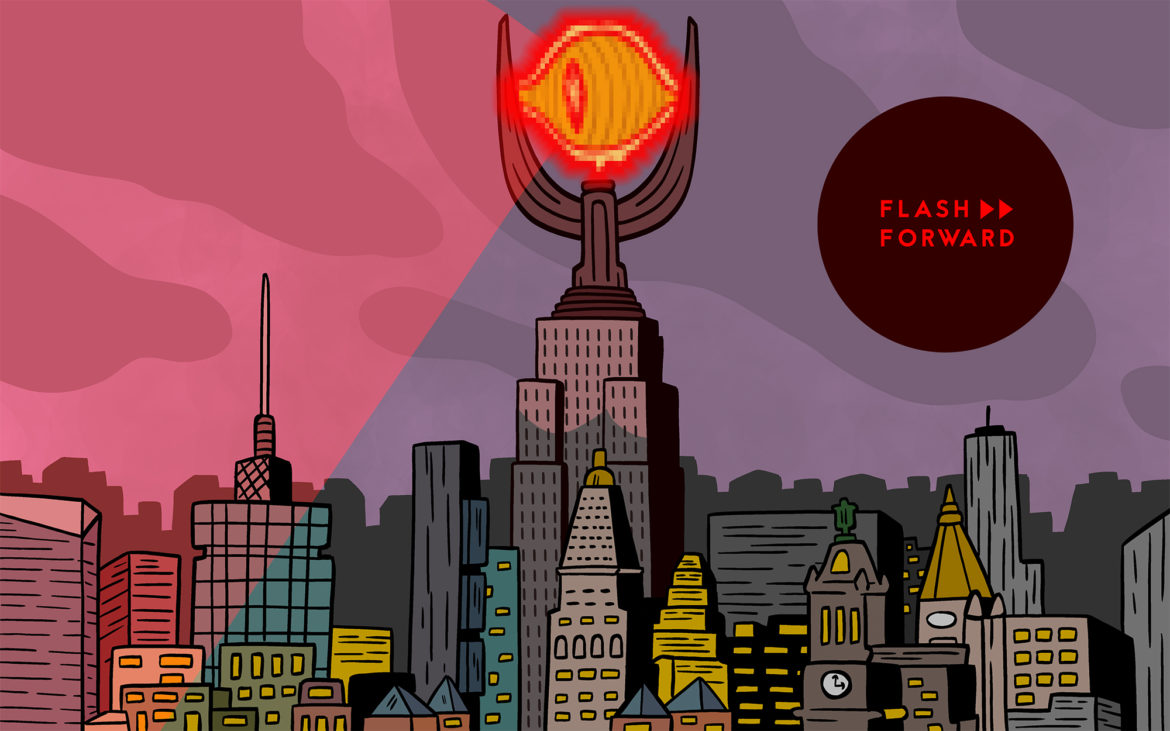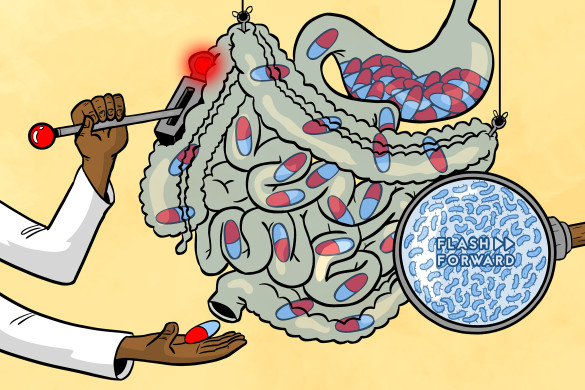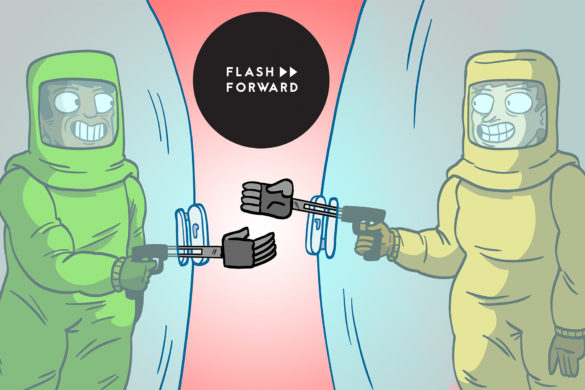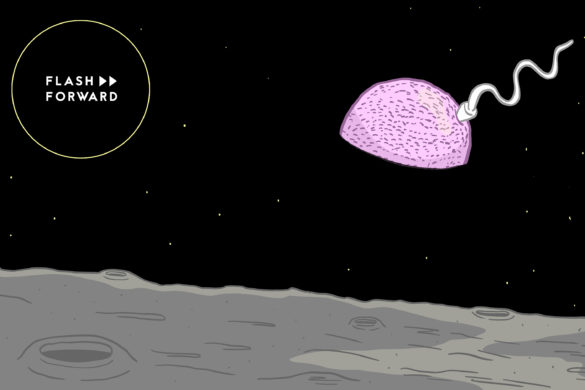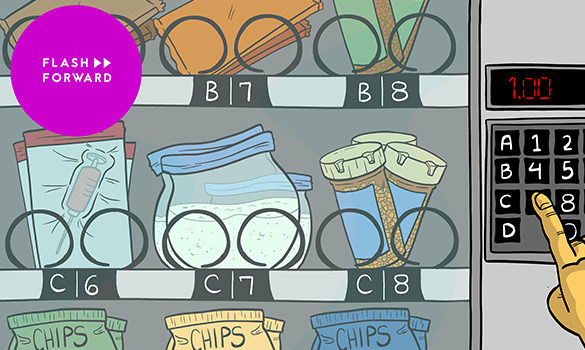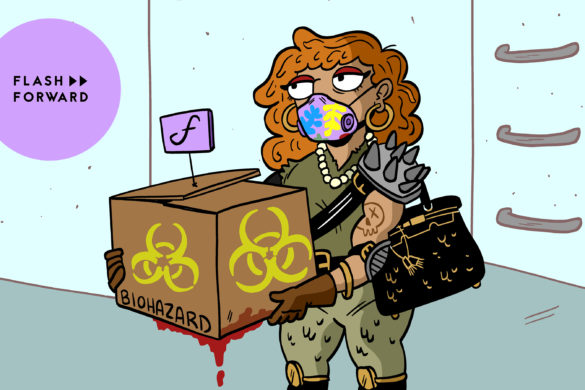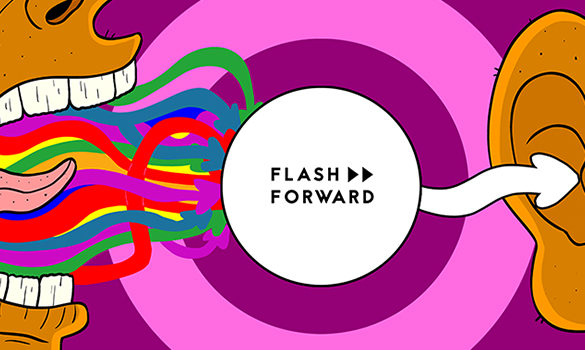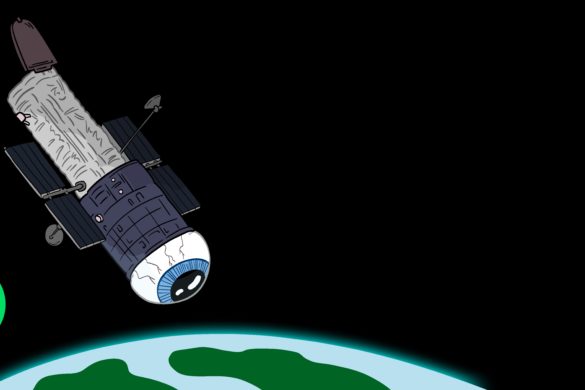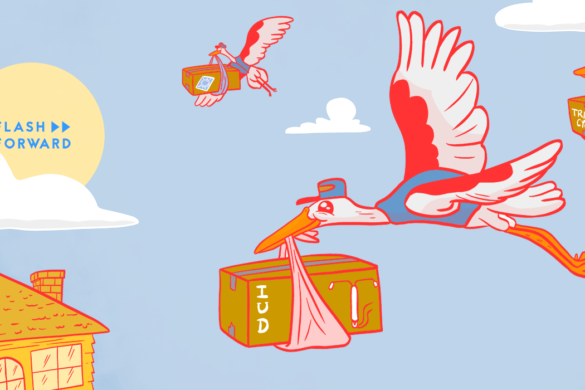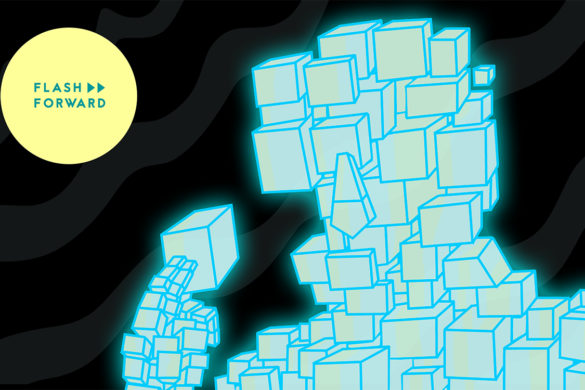Today we travel to a future where cities get smarter…whatever that means.
Guests:
- Ben Passmore, a comic artist and contributor to the Flash Forward book!
- Annalee Newitz, a science journalist, science fiction writer, and author of Four Lost Cities: A Secret History of the Urban Age.
- Dr. Jathan Sadowski, author of Too Smart: How Digital Capitalism is Extracting Data, Controlling our Lives, and Taking Over the World and cohost of a podcast called This Machine Kills.
- Dr. Brenda McPhail, director of the Privacy, Technology, and Surveillance Program at the Canadian Civil Liberties Association.
- Dr. Jarah Moesch, a multidisciplinary artist and lecturer at Rensselaer Polytechnic Institute.
Voice Actor: Smart City Cop — Brett Tubbs
Further Reading:
- Did your rented e-scooter suddenly shut down? Blame the invisible geofence
- Selling Smartness: Corporate Narratives and the Smart City as a Sociotechnical Imaginary
- NYPD used facial recognition to track down Black Lives Matter activist
- Amazon’s Ring has teamed up with over 2,000 police and fire departments
- A Hacker Tried to Poison a Florida City’s Water Supply, Officials Say
- The Captured City
- Big Data, Big Rhetoric in Toronto’s Smart City
- Sidewalk Labs: Privacy in a City Built from the Internet Up
- Preventing Big Data Discrimination in Canada: Addressing Design, Consent and Sovereignty Challenges
- Death of a Smart City
- The Smart Enough City: Putting Technology in Its Place to Reclaim Our Urban Future
- Do You Know What You’re Breathing?
- Watch as the world’s cities appear one-by-one over 6,000 years
- How archaeologists are using futuristic tech to uncover ancient cities
- Angkor Wat’s Collapse From Climate Change Has Lessons for Today
- What the Luddites Really Fought Against
- Mapping Access: Digital Humanities, Disability Justice, and Sociospatial Practice
- Project Sidewalk: A Web-based Crowdsourcing Tool for Collecting Sidewalk Accessibility Data At Scale
Episode Sponsors:
- BetterHelp: Affordable, private online counseling. Anytime, anywhere. Flash Forward listeners: get 10% off your first month at betterhelp.com/flashforward
- Shaker & Spoon: A subscription cocktail service that helps you learn how to make hand-crafted cocktails right at home. Get $20 off your first box at shakerandspoon.com/ffwd.
- Tab for a Cause: A browser extension that lets you raise money for charity while doing your thing online. Whenever you open a new tab, you’ll see a beautiful photo and a small ad. Part of that ad money goes toward a charity of your choice! Join team Advice For And From The future by signing up at tabforacause.org/flashforward.
- Tavour: Tavour is THE app for fans of beer, craft brews, and trying new and exciting labels. You sign up in the app and can choose the beers you’re interested in (including two new ones DAILY) adding to your own personalized crate. Use code: flashforward for $10 off after your first order of $25 or more.
- Purple Carrot: Purple Carrot is THE plant-based subscription meal kit that makes it easy to cook irresistible meals to fuel your body. Each week, choose from an expansive and delicious menu of dinners, lunches, breakfasts, and snacks! Get $30 off your first box by going to www.purplecarrot.com and entering code FLASH at checkout today! Purple Carrot, the easiest way to eat more plants!
Flash Forward is hosted by Rose Eveleth and produced by Julia Llinas Goodman. The intro music is by Asura and the outtro music is by Hussalonia. The episode art is by Matt Lubchansky. The voices from the future this episode were provided by
If you want to suggest a future we should take on, send us a note on Twitter, Facebook or by email at info@flashforwardpod.com. We love hearing your ideas! And if you think you’ve spotted one of the little references I’ve hidden in the episode, email us there too. If you’re right, I’ll send you something cool.
And if you want to support the show, there are a few ways you can do that too! Head to www.flashforwardpod.com/support for more about how to give. But if that’s not in the cards for you, you can head to iTunes and leave us a nice review or just tell your friends about us. Those things really do help.
That’s all for this future, come back next time and we’ll travel to a new one.
FULL TRANSCRIPT BELOW
▹▹ ▹▹ ▹▹ ▹▹ ▹▹ ▹▹ ▹▹ ▹▹ ▹▹ ▹▹ ▹▹ ▹▹ ▹▹ ▹▹ ▹▹ ▹▹ ▹▹ ▹▹ ▹▹ ▹▹ ▹▹ ▹▹ ▹▹
FLASH FORWARD
S7E03 – “What If Our Cities Were Smart?”
[Flash Forward intro music – “Whispering Through” by Asura, an electronic, rhythm-heavy piece]
ROSE EVELETH:
Hello and welcome to Flash Forward! I’m Rose and I’m your host. Flash Forward is a show about the future. Every episode we take on a specific possible… or sometimes not-so-possible future scenario. We always start with a quick field trip to the future, to check out what’s going on, and then we teleport back to today to talk to experts about how that world that we just heard about might really go down. Got it? Great!
This episode is also very, very special because the Flash Forward BOOK is now out!! Ahh! I know that I’ve, sort of, talked your ear off about the book already if you were listening last season, but I am genuinely, really proud of it and I’m so excited for it to be out in the world for you to actually read! The book is made up of 12 chapters, each visiting a different future. Ten of those futures are ideas that we have done on the show before, but totally reimagined, so even if you’ve heard that episode, if you’ve heard every episode of Flash Forward, the chapters are going to feel new to you. They all start with a little comic, and then an essay by me, and I’m just so excited for you to see it.
So, if you haven’t gotten a copy yet, you can go to FlashForwardPod.com/Book and there are a bunch of links for how to order it. There are also two chapters that we have actually never done on the show before. Until now. Because today we are going to talk about one of the futures that, frankly, I had been, kind of, avoiding; for years, actually. I just couldn’t really figure out what to say about it, or how to make it interesting. Thankfully, for the book, I got to work with these incredible artists, and the artist who took on this idea had some really cool ideas.
So without further ado, let us go to this future. And if you can, and would like to, please buy the book. And if you do buy the book, please shop at your local independent bookstore if you can. If you have one, that would be great.
Okay, on to the future!
FICTION SKETCH BEGINS
[ambient city sounds]
[a cop walks up and settles down on a bench, casually snacking on chips]
COP:
All right, my favorite little informant. What do you have for me today? (chewing)
[low toned beep]
(mumbling to himself, frustrated) Oh, come on, why won’t this connect?
[beep]
Password? I don’t know. What’s my password? I know I wrote it down here somewhere.
[pause]
Aha! Okay… b-e-n-c-h-n-a-r-c. (chuckles to himself) Oh right, that’s funny.
[beep]
Am I a robot? No, I am not a robot. But you are, my little buddy.
[beep]
Okay, let’s see what we have.
(scrolling through footage from the bench) Nothing… Awkward date… Sleeping, send a ticket for that one.
[affirmative ding]
Squirrel… Loitering… Oh? Ah, nope, just loitering. Send a ticket for that one.
[ding]
Okay, here we go. Teenagers, probably about to do something they shouldn’t do… Oh yes… (getting excited) Oh yes! You’re about to vandalize, aren’t you? Ha-ha! Excellent. Spray paint, how quaint. Okay, run each face and show me who they are and where they went. This’ll be fun.
[beep]
[continues to snack while waiting, then throws to the trash but misses the can]
[ding]
A littering ticket? Me?? Ridiculous! (walks away)
[city sounds continue]
HACKER:
Hi, bench.
[beep]
I see that you’ve been turned into a narc.
[beep-beep]
You don’t want to be a narc, do you, little bench?
[beep-beep-beep]
I didn’t think so. Don’t worry, this should do the trick.
[rapid beeps, followed by hissing, electronic-shorting sounds]
Okay, now for the rest of your buddies…
[city sounds fade out]
FICTION SKETCH END
ROSE:
Okay, so on this episode we are headed to the big city. The bright lights. The bright, interconnected, always-listening lights. That’s right, it is time for the smart city! A city where everything is networked and efficient, where even your park bench gathers data, where sensors and video cameras cover every inch of your neighborhood for… some reason.
This is, coincidentally, the first chapter of the Flash Forward book! Okay, it’s not a coincidence. I very much timed this episode to come out for the book launch. And the first chapter introduces you to a family living in a future smart city.
BEN PASSMORE:
I wrote a story in which the protagonist is basically like our generation, like, 30, 40 years from now. So, it made me think about, like, what life will be like then in a much more concrete way.
ROSE:
This is Ben Passmore, the artist who created the comic for this chapter. And just as a little behind-the-scenes on how the book was made, every artist picked their top three topics from the long list of Flash Forward episodes available, plus a couple of new ones like this one. And Ben picked smart cities. So I asked him why he was drawn to this topic in particular.
BEN:
I was in Mexico City, I think sometime around, you know, when I got the list maybe, and I was in a neighborhood that was more of, like, a tourist neighborhood, you know what I mean? So it’s like one of the only neighborhoods in Mexico City where you might hear some English. And I was driving around a Bird scooter because I’m being an ignorant tourist. That’s the kind of person I was being. And I was like… I wanted to leave the bougie neighborhood and just go to a regular neighborhood because that’s a more interesting place to be in, you know I mineral?
And the Bird scooter just almost immediately shut down. It was only allowed to drive within, like, the nice area. So, this was new to me. I was like, “Oh…” It was just an interesting way for me to be, like, kept out of a neighborhood, right? So I was just thinking about that, and it’s always in my head, like, the different ways that our activities are policed in that way, you know what I mean? So, like I said, I’m depressing, so I just extrapolated to that: What if a whole city is constructed like this?
ROSE:
I won’t spoil what happens in the comic, because I do hope that you get the book and read it! But one of the big themes present in the comic is this idea of surveillance and who gets access to what.
ANNALEE NEWITZ:
It’s not that I’m anti-smart cities, I think we already live in smart cities. I mean, anyone who’s ever lived in a city with CCTV has lived in a smart city. That means London has been a smart city since, like, the 1980s, basically.
ROSE:
This is Annalee Newitz, a science journalist, science fiction writer, and most recently, the author of a book called Four Lost Cities: A Secret History of the Urban Age.
ANNALEE:
Smart cities, that’s just really a fancy way of talking about designing cities with two different things. One is making them more sustainable by having smart grids, right? By allocating power in a way that makes sense, tracking traffic in ways that makes sense. But the other piece of the smart city is creating this, kind of, surveillance capitalist dystopia. And unfortunately, people who are building smart cities now, the companies that are investing in them, are just smushing those two things together. They’re like, “Oh, well, if you want to have a smart grid, obviously you want to have cameras everywhere, too.”
ROSE:
This is, really, why I kind of avoided doing a smart city episode for so long. Because, listener, you probably already know that putting a bunch of facial recognition cameras, and sensors, and surveillance systems around a city is not something that I’m going to be super into. And ‘smart city’ is such a buzzword, and it’s usually a buzzword that goes hand-in-hand with the darker side of technology. I mean, what does it even mean for a city to be “smart”?
DR. JATHAN SADOWSKI:
Yeah, everything is smart, right? And it has the, kind of like, normativity built into it, because you don’t want something to be dumb or stupid. You want it to be smart.
ROSE:
This is Dr. Jathan Sadowski, the author of Too Smart: How Digital Capitalism is Extracting Data, Controlling Our Lives, and Taking Over the World. He’s also the co-host of a podcast called This Machine Kills.
JATHAN:
There is so much hype around it. Like, this is definitely a hype economy that’s built on… you know, and it’s not only the smart street light, right? It’s the smart everything in our daily lives.
ROSE:
Smart cities are constantly the focus of headlines about how connected street lights will end traffic, or smart garbage cans will streamline waste collection.
JATHAN:
It definitely relies on this breathless, kind of, marketing pitch to sell you on, “This is the future. This is great. This is awesome.”
ROSE:
And some of that could be true.
ANNALEE:
We have to kind of think about the smart city as a set of technologies that can be disassociated from each other. Like, we can have a smart grid without having surveillance capitalism.
ROSE:
But today, in practice, these things are often packaged together. And a lot of the time, the ‘winners’ in a smart city aren’t the everyday people who live there.
JATHAN:
Because these technologies are not really meant for the public or meant for consumers. The real benefits are going to somebody else, right? Whether it’s a company that’s collecting that data, whether it’s city planners that are somehow using that to manage the city, or in a lot of cases, it’s police.
ROSE:
It’s also worth saying that a lot of the systems hyped by the smart city industrial complex, don’t actually work very well. In Barcelona, for example, the sensors that they installed in parking spots to detect which ones were open stopped working any time a train went by.
JATHAN:
My favorite example of this is the 5G infrastructure as well, where like, you know, 5G is so brittle and fragile as a network infrastructure. There’s reports that a window can block 5G signal. What it means, though, is that in order to get around these systems that are really glitchy and really brittle, it does require, like, massive investment in infrastructure. So you have to have, for 5G for example, you have to have these, kind of like, cell relay stations installed everywhere; in the hallways of your apartment building to every street corner, because they don’t work in the way that people want them to or in the way that’s necessary to bring any of the kind of connectivity, the blanket connectivity, that’s meant to be involved with them.
ROSE:
In other cases, these digital systems are poorly protected. In February, someone hacked into the water supply system for a city called Oldsmar in Florida.
[clip of press conference in Oldsmar, county sheriff:]
“One of the functions opened by the person hacking into the system was one that controls the amount of sodium hydroxide in the water. The hacker changed the sodium hydroxide from about 100 parts per million to 11,100 parts per million. This is obviously a significant and potentially dangerous increase. Because the operator noticed the increase and lowered in right away, at no time was there a significant adverse effect on the water being treated.”
Jathan actually calls the smart city, the captured city.
JATHAN:
You’ve got these technologies that are not meant to make the cities smart in that sense of, like, convenience and efficiency but are more so meant to capture the city, create a kind of blanket of surveillance, highly effective ways of enforcing law and order in the city. So in reality, when we think of the smart city, we should be thinking of the captured city in the sense of whose interest is this version of the city… whose interest is it serving?
BRENDA MCPHAIL:
What’s in it for us as a community? What’s in it for us as residents of this place who are going to live and work here, probably long after the company who’s pitched the proposal is gone?
ROSE:
This is Dr. Brenda McPhail, the Director of the Privacy, Technology, and Surveillance Program at the Canadian Civil Liberties Association. And Brenda knows the ins and outs of these questions better than most people because she works in Toronto, where, four years ago a project called Sidewalk Toronto was announced.
BRENDA:
And it was pitched as, you know, “We’re going to build the neighborhood of the future in Toronto. We’ve got this hungry start-up company Sidewalk Labs with all of the backing of Google and Alphabet behind them to bring the future to this section of Toronto.”
ROSE:
Sidewalk Labs is a subsidiary of Alphabet, the same giant tech corporation that owns Google. And Sidewalk Toronto was going to be built on a piece of waterfront property.
BRENDA:
It’s apparently one of the largest vacant pieces of waterfront land in North America. Very, very valuable land.
ROSE:
And this new development in the city was going to be an incredible experiment. A testbed for technology. A smart community.
BRENDA:
The wording was, “We’re going to build a community from the internet up in Toronto.”
ROSE:
Which sounds cool, right? Maybe. But immediately, Brenda and others had a couple of questions.
BRENDA:
Why do we need this American company to come into Canada to take possession of some of the most valuable real estate that we have and essentially use it as a technology testbed?
And of course, I was concerned about the privacy stuff. I was concerned about data. How was it going to be collected? How it was going to flow? Who was going to get access to it? How much was going to be collected? What kinds were going to be collected? How sensitive it was going to be. All of the, you know, chaotic, tumbling of questions that you want to know about when you’re talking about tracking people’s movements and behaviors as they move through the places that they live.
ROSE:
There were also questions of whether this community would be affordable. Who would even be able to live here? In fact, a really broad coalition of people came together in Toronto to organize against this project.
BRENDA:
There was a lot of public uprising. There was a really active coalition called Block Sidewalk that was working on these issues. There were community organizations, everything from environmental groups to labor groups, who were standing up and speaking up.
ROSE:
And it worked. In 2020, Sidewalk Labs announced that they were shutting down the project. In the announcement, they claimed it was because “unprecedented economic uncertainty has set in around the world and in the Toronto real estate market.” But nobody I’ve talked to really believes it was about uncertainty in the real estate market.
BRENDA:
Publicly, there are, you know, political leaders who have, sadly, bemoaned the fact that that was just the truth and it was just what happened. But privately, I don’t think anybody who was deeply engaged in these issues really believes that to be true. I think what’s true is they thought that Canadians were going to be polite, and nice, and roll over and play dead, and they were surprised from the beginning at the amount of opposition that there was.
ROSE:
When I was working on the Flash Forward book chapter about smart cities I read a really interesting book called The Smart Enough City, by Ben Green, who used to work in Boston’s Department of Innovation and Technology. And something he says in that book actually really stuck with me, which is that, often, these smart city bells and whistles are trying to use technology to solve problems that are really questions of politics and civics. Where should roads go? Who should we design a stretch of road for: pedestrians or cars?
This is something I talk a lot about on Flash Forward, this desire to solve social, economic, political problems with code or gadgets. Not everything can be fixed by an app, or by data collection, or by AI. And yet, that is sort of what smart cities promise us. They say that if you give mostly private companies all your data, they will magically make your city better. Take for example, the app Purple Air.
ANNALEE:
… which is this sensor network for smoke. And when we had all our fires in the West, you know, everybody was using Purple Air because they had the best crowdsourced sensor network.
ROSE:
During fire season, I personally check Purple Air all the time. And when the fires were really bad a couple years ago, there was this story written up about the guy who created that sensor network that Purple Air uses. The story was that he got the idea for Purple Air because he lived in a part of Utah that was being polluted by a nearby mine.
ANNALEE:
And the story was, “Oh, once he had all the data, they were able to prevent the mine from polluting.”
ROSE:
But that’s actually not what happened.
ANNALEE:
When I called him up, I was like, “Is that true?” And he’s like, “No! Actually, we gathered a bunch of data and it didn’t do any good at all. And we basically just went to the city council meeting, like, every day for a year and screamed at them. And that was what helped.” And even then, they still have a ton of pollution; it didn’t actually help that much. So, the “smart city” is really just a bunch of angry people at city council meetings. Honestly, the thing about cities is we perfected city technology a long time ago.
ROSE:
A city doesn’t become better through data. A city is a place for people.
BEN:
They’re such complicated entities, built out of necessity and opportunism, you know, that in a lot of ways, cities feel like very unnatural places. But when I think about what I enjoy about a city, it doesn’t actually really have much to do with the technology. The things I like about the city is that there’s a lot of people there and there’s a lot of, like, everyday ingenuity and culture that potentially makes them very vibrant places.
ROSE:
That’s Ben Passmore again.
BEN:
I find that the cities I like the most are… I like Port-au-Prince, or I like Mexico City, or places like that that are… I mean, Port-au-Prince and Mexico City, these are massively different cities. But there’s a lot of people, there’s only so much oversight that’s possible, right? So there’s a lot of people, like, just kind of doing what they can in the margins. And I find that kind of environment to be really exciting.
The technology itself is not exciting to me. Like, Bird scooters are whatever. But then the kids figured out how to hotwire the Bird scooter and I was like, “That’s amazing. I’m happy Bird scooters are around.”
ROSE:
And so for this episode, I want to talk about what the future of cities could be. Let’s just forget the idea of “smartness,” whatever that means. What makes a city good? What makes a city fun, and vibrant, and accessible, and successful? Why do people even go to cities in the first place?
All that and more, when we come back.
ADVERTISEMENT: BETTERHELP
This episode is supported in part by BetterHelp.
On this show, we’ve talked a couple of times about mental health and how to cope with everything from memory loss to freaking out about the end of the universe. There are nine million reasons why you might want to talk to a therapist, and BetterHelp can help connect you with one. When you sign up, they will assess your needs and match you with your own licensed professional who you can start communicating with in under 48 hours.
Here’s a fun fact for you: What year do you think telehealth was first discussed in the medical literature? It was 1879, in an article in The Lancet that suggested that telephone calls could reduce unnecessary doctor’s visits.
When you connect with your BetterHelp therapist, I can pretty much guarantee that the connection will be better than it was in 1879, and no matter where in the world you are, what your trouble is, what you’re looking for, BetterHelp has someone for you. You can log into your account any time and send a message to your counselor, and they will respond with timely and thoughtful answers. Plus, you can schedule weekly video or phone sessions so you won’t ever have to sit in an uncomfortable therapy waiting room. BetterHelp is also committed to facilitating great therapeutic matches, so they make it easy and free to change counselors if you need to.
In other words: BetterHelp wants you to start living a happier life today. Visit BetterHelp.com/FlashForward and join the over one million people who have taken charge of their mental health with the help of an experienced professional. In fact, so many people have been using BetterHelp that they are recruiting additional counselors in all 50 states.
And there is a special offer for Flash Forward listeners. Get 10% off your first month at BetterHelp.com/FlashForward.
ADVERTISEMENT END
ADVERTISEMENT: PURPLE CARROT
Here is a fun fact about spinach: It is not quite as loaded with iron as you and Popeye the Sailor might think. In 1870, a German scientist named Erich von Wolf accidentally misplaced a decimal point in his research on just how much iron spinach contains, and it took 70 years for anybody to notice this mistake.
That amazing fact comes to you from Patron Kristin Farky, and it is the perfect way for me to segue into telling you a little bit about one of our sponsors: Purple Carrot.
Purple Carrot is the plant-based subscription meal kit that makes it easy to cook irresistible meals to fuel your body. Each week, choose from an expansive and delicious menu of dinners, lunches, breakfasts, and snacks. Very important, the snacks.
You can sign up for a plan, like High Protein, or Gluten Free, or Quick and Easy, or customize your order every week. You can skip or cancel your box anytime. Every Purple Carrot box is an opportunity to learn and experience something new with easy recipes and fresh, pre-portioned ingredients. No shopping, no food waste; just restaurant quality, plant-based meals.
Get $30 off your first box by going to PurpleCarrot.com and entering the code FLASH at checkout today. Purple Carrot: The easiest way to eat more plants.
ADVERTISEMENT END
ROSE:
Today, experts predict that two out of every three people will live in cities by 2050. You probably know someone who lives in a city. You might live in a city yourself! You may be listening to this from within a city. But cities are a relatively new phenomenon for humans. People did not used to live in huge, crowded centers. Compared to the whole of human history, cities are still in their infancy. So maybe before we understand the future of cities, we have to understand why cities became a thing in the first place. Why do people move to cities?
ANNALEE:
It’s an incredibly good question, and that’s part of what I was wondering when I started the book, and I still don’t think I have the perfect answer. But certainly one of the things that stood out to me was that cities are places that people go to party. And that’s one of the earliest parts of city life, we see it continuously in every city. And when I say partying, I mean having a feast, having a bunch of people over, lighting a big fire, eating a bunch of food, maybe breaking some plates, exchanging some jewelry, just having a fun time.
And we absolutely see evidence of this. We see garbage piles full of half-eaten bones, and that’s always… that’s the signature of a party in the Neolithic. If you didn’t finish eating a piece of meat, you were probably partying, because otherwise, like, why would you waste it?
ROSE:
And one of the first, if not the first-ever city, goes all the way back to around 7400 BC.
ANNALEE:
So the first city in the book, which is one of those places that’s debated whether it’s a city or not, Çatalhöyük in central Turkey, had maybe about 5,000, 10,000 people living there. So, not big, but it was very high density. Everyone’s houses were literally stuck together. They were built kind of like an apartment complex.
ROSE:
Today, the concept of cities doesn’t really seem all that unique, but in 7000 BC, people did not live in large groups settled in one place. The idea of a city was weird, and new, and probably kind of scary. Humans up to that point were nomadic, living in small groups and moving around all the time.
ANNALEE:
So it’s this really early stab at trying to come up with a way that humans can live in a high-density environment. And how do you build something that is a totally human space within nature? And so, like I said, it’s kind of… it’s a beta test, it’s a first try. You know, like they said, “Okay, well, why don’t we just build an entirely artificial environment that’s literally elevated off the ground so that when you’re walking through the city, you are never walking on something that isn’t built by human hands?” which I think is super interesting. And people live there for almost 2,000 years. So it was a beta test, but it was a pretty successful beta test. And you know, in the end, it didn’t work out, but it sure was a going concern for quite a long time.
ROSE:
If you have ever lived in a city, you have these ancient experimenters to thank for it. And the reason that I called Annalee, aside from the fact that I really enjoyed their book Four Lost Cities, is that one of the main things that the book talks about is how cities die, basically. What makes a city fail? How do you go from millions of residents to… basically nothing?
It might seem a little weird to talk about lost ancient cities in an episode ostensibly about smart cities and the future, but I think actually if we want to build better cities, and really figure out how to make cities great, we need to learn the lessons of these failed cities. If the goal of “smart cities” is to make these urban centers healthier, more sustainable, more livable, we need to understand what makes a city the opposite, right? What are we trying to avoid? And can technology actually help us avoid those things, or not?
ANNALEE:
Cities are abandoned when they’re hit by two problems at once. And the problems are climate disasters or some kind of infrastructure disaster; something to do with the built environment or the natural environment goes wrong. So there’s a drought, there’s a flood, or the city is crumbling and the infrastructure needs repair. So those things have to happen and political instability at the same time.
ROSE:
Cities that just get hit with a climate disaster, but that are economically and politically healthy, generally survive. Cities that are politically in shambles but don’t have some kind of climate chaos going on can also survive. But when you combine the two, that is when you are in trouble. Because while city living can be fun, and lively, and full of excitement, it is also true that living in a city can be really, really hard.
ANNALEE:
Almost every city that I looked at, including ones that aren’t in the book, had a similar problem, which is that people come to cities to have fun and to meet interesting people. But when they stay in the city, they have to do work to maintain the city. So, there’s an extraordinary amount of labor that goes into the city. And there’s a lot of ways that city leaders try to mobilize that labor.
ROSE:
In many early cities, the leaders treated that labor force really badly. Many of the people who built and maintained some of those big, early cities were enslaved, often because they were prisoners of war or were working to pay off debt.
ANNALEE:
And at that point, when you think of how a city is basically the sum of its laborers, the people who keep the roads smooth, who keep the canals free of silt, who keep the walls from falling down, then you start to appreciate that cities are really about how you treat the people in them. And so if you have a group of elites who are mistreating the laborers, that can last for a short time, but over a longer period of time, over a generation or two, people just start to leave.
ROSE:
Cities often start to fall apart when residents who don’t have very many resources can no longer survive there. They have to look elsewhere for livable conditions, so they start to leave. And if you have both things: workers walking away, and then a climate crisis, the city starts to completely fall apart.
Angkor is a great example of this. In the 1300s, the city suddenly started experiencing some really weird weather. First, a long period of drought. Then, years of extreme monsoon rains that flooded the city. It got harder and harder to maintain Angkor’s extensive canal system. Some places couldn’t get any water, other places were flooded; people even started dismantling temples for emergency bridge-building materials.
ANNALEE:
The city is only as good as its people. So when we see abandonment that isn’t caused by a volcano or some other natural disaster, it’s almost always a slow process. It usually takes about 100 years. And it’s generally because people find that the city is no longer being maintained, either because they’re not being paid to do it in whatever form they’re being paid, or because the city government or leaders aren’t allocating part of their funding or their wealth to maintaining it.
ROSE:
Reading Annalee’s book actually made me think about cities really differently. Cities aren’t structures, or roads, or skyscrapers. They are people. And if you don’t treat the people in a city well, they’ll leave. And in fact, a lot of really important, huge cities have gone through kind of a boom-and-bust cycle like this. London, Istanbul, Cairo, they have all grown and shrunk over the years. And maybe that’s what will happen in our future, too.
ANNALEE:
It’s very likely that we will go through another phase of that kind of dispersal where people become disenchanted with cities for all kinds of reasons; because cities are being run by an authoritarian government that mistreats workers, or because cities are unsanitary, or because people don’t want to live that way. It’s too crowded. There’s a lack of privacy. There’s a lack of resources.
ROSE:
Right now, lots of cities are facing the dual problems Annalee laid out.
ANNALEE:
I think a lot of cities right now across the globe are facing that twin problem of climate instability and political instability.
ROSE:
If we want cities to survive, we have to figure out how to solve these problems.
ANNALEE:
So I think, moving forward, a lot of our experiments with urbanism and a lot of the ways that we’re going to make good cities is really simple political stuff, like acknowledging that essential workers need to be paid like essential workers and that that means paying them better, giving them health care benefits, giving them a better minimum wage, giving them housing or giving them access to housing that they can afford. And it’s also going to mean thinking about actual climate solutions that go beyond the borders of the urban space and into the rural areas that are providing food and other resources for urbanites.
ROSE:
This isn’t the smart cities we get pitched day to day. It’s not the stuff we see in shiny commercials, or in marketing packages, or, in my case at least, in hyperbolic press releases cluttering my inbox. But I think that this is the more hopeful version of the future of cities. And when we come back, we’re going to talk about that hopeful vision of cities, one that includes technology but also thinks about who a city is for and how to actually innovate and make things better for everyone. But first, another break.
ADVERTISEMENT: REALM
Before we head back into smart cities, I want to tell you about a new podcast company called Realm, which is sort of like part podcast studio, part magical refuge.
Realm is an audio entertainment company that creates original fiction podcasts, including official continuations of popular franchises like Orphan Black. Realm has a whole bunch of shows you can check out, but the one that I want to tell you about today is called Memory Lane. It’s from the writer behind the hit series Pretty Little Liars, and it’s a psychological thriller about mothers, and daughters, and the dangers of memory.
So here is just a very quick synopsis: Alex Bryant has questions that only her mother, Cassie, can answer. So when Cassie suggests they both participate in a study on implanted memories and help heal their estranged relationship, Alex believes that her chance has finally come. Maybe after a lifetime of wondering, she will finally learn who her father is, and why her mother insists on keeping his identity a secret.
After the study, the memories Alex receives seem, sort of, tainted. Flashes of people that are missing from Cassie’s memories. Places she claims to have never visited. Violent events she swears never happened. As the women retrace Cassie’s steps from a fateful road trip years ago, their relationship is pushed to its breaking point. When Alex is on the brink of discovering the truth, a threat from Cassie’s past resurfaces, determined to stop the women in their tracks. They are forced to run from their own minds. Alex and Cassie have to trust one another like they’ve never before. It’s the only way to survive. Very exciting stuff.
Sounds interesting, right? The first episode came out last week and there is a new piece of the story every Wednesday. You can check it out wherever you get your podcasts. The cast includes Emily Woo-Zeller, Tiana Camacho, and many more. You can listen to Memory Lane anywhere you get your podcasts.
ADVERTISEMENT END
ADVERTISEMENT: KNOWABLE
What do NBA All-Star Chris Paul, NASA commander Scott Kelly, and super smart podcaster Kristen Meinzer have in common? They all have incredible experiences, and they have taken those experiences and crafted audio courses to teach you what they have learned. Those audio courses are on Knowable, which is a new app where the world’s top experts teach new skills in bite-sized audio courses.
It’s sort of like someone took a podcast, added audiobook, and put them in, like, a pressure cooker, and then stood back and released that pressure with a totally normal and not-terrified facial expression, and what they got were little snippets of pure, distilled learning.
NASA commander Scott Kelly teaches lessons learned from a career in space. NBA All-Star Chris Paul discusses the performance benefits of his plant-based lifestyle. And podcaster Kristen Meinzer tells you everything she has learned about how to be happier from years of research.
Knowable is accessible on your phone and on the web, and each audio course is broken out into individual lessons, usually about 15 minutes long. You can explore at your own pace, and each class is supported by downloadable materials, lessons, recipes, and more. I know that you like learning, okay? You don’t have to lie to me. We are friends, sort of. And this is a place where learning is cool and good, and you can do it on Knowable.
So are you ready to learn something new today? You can download the Knowable app or visit Knowable.fyi and use the code FLASHFORWARD for an additional 20% off.
ADVERTISEMENT END
ROSE:
Okay, often when you critique something like smart cities, the response that you get is something like “Why do you hate technology so much?” or, “Oh come on, don’t be a Luddite.”
JATHAN:
I get that question all the time, to the point where, like, I am now committed to reclaiming the label of Luddite. I self-identify as a Luddite, but I do so in a way that I think the Luddites have gotten a really bad name for themselves, in part because the actual history of Luddism and the purpose of this movement has been obscured over the last 200 years.
ROSE:
That’s Dr. Jathan Sadowski again.
JATHAN:
For me, I’m not anti-technology as such. It is very much about understanding how technology materializes certain values and interests in the world; how it materializes and solidifies certain kinds of power dynamics and social relations in the world.
ROSE:
You have probably heard the term Luddite, but what you might not know is that Luddites were not smashing any and all technology willy-nilly. They did not hate technology out of some bizarre and irrational fear of progress.
JATHAN:
They weren’t doing it because they were afraid of technology. They were doing it particularly as a way to target factory owners who were running extremely dangerous conditions, exploiting people for their labor, extracting everything from these people, and using these technologies intentionally as a way to disempower people.
And when you look at the history, the people in this Luddite movement were very well aware of that… they were very explicit, like, “When we’re smashing this technology, we’re smashing a type of social relation that we see as exploitative, as extractive, as creating a type of society that leaves us out of it.” And so that’s… You know, when someone says, “Are you anti-technology?” I say, “No, I’m a Luddite.” And then I have to explain to them what I mean by that. But I think it’s worthwhile.
ROSE:
Also, side note – and this fact, Julia found (thank you, producer, Julia): Luddites were not just into smashing exploitative labor practices. They were also into smashing the gender binary. They actually had an imaginary leader, a man named Ned Ludd, who was often depicted wearing a dress. People in the movement who mostly identified as men would sometimes wear women’s clothing at protests, describing themselves as the “wives of General Ludd.” Anyway…
Jathan is not anti-technology. He is anti-capitalism, against a system that exploits workers endlessly to make a small number of people very rich. I get this question all the time too, “Why do you hate technology? Why do you keep bashing technology?” And I don’t hate technology. I love technology. If I hated technology, I would not spend all of my time thinking about it and thinking about how to make sure that it is just, and fair, and useful.
JATHAN:
I think we all deserve a better class of technology than the one that we are currently given.
ROSE:
And Brenda, who works in Toronto, says the same thing. When they were asking questions about data usage, and privacy, and what exactly Sidewalk would be doing with that data, they got the same kind of pushback.
BRENDA:
And I had to say again and again: I love technology. Technology can be awesome. There are times when it works for people. There are times when it works against people. You have to convince us, those of us who love technology in Toronto, that you are working for us and not against us, and you have failed to do that. This is not about us not understanding the technology. Perhaps this is about us understanding it more than you expected us to.
ROSE:
And that is why I find the Toronto story, actually, a really utopian story. It’s a story that rejects this idea that powerful corporations can do whatever they want, that they’re the only ones who get to write the future.
JATHAN:
I mean, that question of inevitability is really important to, kind of, put our finger on as well, because so much of the power of tech companies relies very heavily on proclaiming that resistance is futile, right? This is the Borg complex. And I think that, you know, the organizers and communities in Toronto against Sidewalk Labs really showed how that power can be neutralized, that there isn’t inevitability, and that you can cause something like Sidewalk Labs – which is a sister company, a Google subsidiary of Alphabet, one of the largest, most powerful corporations to ever exist in the world. And you can actually neutralize something that they spend so much time, and effort, and money into saying is inevitable.
ROSE:
And taking that inspiration further, let’s talk about what our cities could look like. What a better version of our cities could look like.
DR. JARAH MOESCH:
When we imagine the city of the future, do we imagine this clean, you know, efficient, almost-bodiless society where everything just sort of moves along?
ROSE:
This is Dr. Jarah Moesch, a lecturer at Rensselaer Polytechnic Institute.
JARAH:
Fixing broken sidewalks, getting street lights turned on, getting rid of broken windows policing. Those kinds of things are all part of making a better future, a better city. And it doesn’t matter what you do with the technology, it doesn’t matter if you have autonomous vehicles driving around the city. None of that matters if you as a person can’t get from your house to wherever you need to go safely.
If you don’t have housing, if you don’t have food, if you don’t have water… And not just food and water, but safe, clean, affordable food and water. What happens if we take affordable out of the equation altogether? What if we say that housing, food, water, and clean air are all a human right? If we start there, what happens to the city?
ROSE:
Jarah says that the key to good cities is thinking not just about those kinds of questions, but also about who is answering them.
JARAH:
It shouldn’t be, “I’m an engineer. I’m going to go design for this particular community.” Just take a look at some of the majorly failed engineering projects around the world. I remember, many years ago I was in Tanzania, and I ended up buying some bracelets from a woman who had made the bracelets out of PVC piping that had been imported from a Western country, not sure where, and installed to help pump water into her village. But the problem was that PVC piping was not available locally. The system was very complicated and very expensive. So it worked… until it didn’t.
And then they hadn’t trained anybody in, you know… nobody understood how it worked. It didn’t even make sense to them because it wasn’t culturally, or historically, or ecologically the way water worked in that part of the country. And so all these things weren’t taken into consideration. Somebody had money and said, “I’m going to build this pump,” you know? And so they ended up basically sawing down the PVC piping, carving it, and selling it in order to… because it didn’t work in the way it was originally intended.
ROSE:
If you want an accessible city, which I think we should all agree we want as a better version of the city, you need to have disabled folks designing it. If you want a just and equitable city, you need to invite those in who are not powerful and rich.
JARAH:
I have, sort of, my own manifesto called Queer Justice Design, which is a whole way of working… Designers who are not from communities they’re trying to work with, how to do something equitably and to make sure that people’s voices are not only heard, but that they’re actually creating the design and are part of the design process and the design questions to begin with.
But I also think that, to a large extent, we don’t think about, like, the memory, and history, and the archive of the city itself as we move forward. And what happens when we do all this, you know, technological innovation? How do we retain the collective memory across all of these varying identities and intersectional identities, right? Thinking about how zoning wiped out, you know, the queer community in New York City, for example. So thinking about, what happens to those collective memories, the individual memories? How does the remaking of the city… what does it do to our unofficial knowledges and the ways that we move around the city?
ROSE:
Jathan says that maybe the utopian future of cities is actually about dismantling, not building.
JATHAN:
Not all innovation deserves to exist. And I think that is a really radical statement in a world right now where, like, innovation is held up as the key; it’s the top thing that we should all be striving to do. By even opening ourselves up to the question of dismantling technology, whether that means, you know, in a political sense of just striking the budgets for maintaining these, kind of, vast policing infrastructures, or canceling these lucrative contracts between Amazon’s Ring and thousands of police departments across the US. That’s a form of dismantling, right? This kind of defunding.
But I think it also means things quite literally, like ripping out and destroying some of these technologies. Again, it gets back to that example that, just because something exists doesn’t mean it deserves to exist or that it should continue on in this kind of ossified form in perpetuity.
ROSE:
What if we took back not just the city, but the technology behind it? A lot of this is about, not rejecting technology, but in fact the opposite. Demanding more of it. Asking these companies to actually make our lives better. Really better, not just painting over the problems that exist.
JATHAN:
It means demanding more and it means expecting that they actually live up to their promises. And if they don’t, then, okay, get out of the room, someone else can do that better than you, clearly, because you are not succeeding.
And rather than settling into this kind of space of being these individual consumers, we have to act collectively as a community, as a community that is more invested than they are in the kind of society that we build and the kind of futures that we actually materialize.
ROSE:
This is a message that I end so many episodes of Flash Forward with that maybe it’s now a cliché of the show. But it is true. You probably cannot stop Amazon from existing writ large. No one person can do that. But you can connect with your people, and think about what actually serves your community, and ask for that.
Don’t just accept whatever tech billionaires and politicians offer. Ask for what you actually need, what would actually make your city better. Because cities are what we make of them. They’re made up of people like you and like me. Cities die if we let the rich exploit the workers. They die if we let them become inaccessible and unlivable for residents who don’t have unlimited money and resources. We have to stand together to keep our cities whole and worth living in.
And maybe that means wearing dresses and breaking some machinery.
[Flash Forward closing music begins – a snapping, synthy piece]
Flash Forward is hosted by me, Rose Eveleth, and produced by Julia Llinas Goodman. The intro music is by Asura and the outro music is by Hussalonia. The episode art is by Matt Lubchansky. The voice of the cop from the intro this week was played by Brett Tubbs.
If you want to suggest a future idea for a future episode, send us a note on Twitter, Facebook, or by email at Info@FlashForwardPod.com. If you think you have spotted one of the little references that I have hidden in the episode, you can email us there too, Info@FlashForwardPod.com. If you are right, I will send you something cool.
If you want to have a conversation about this episode, talk about smart cities, or just talk about another episode or the future in general, you can join the Flash Forward Facebook group! Just search ‘Flash Forward Podcast’ on Facebook and ask to join. There is a singular question you have to answer. I promise it is very easy. You can say basically anything. I just want to make sure that you are in fact a listener of the show.
If you want to support the show, there are a couple of ways that you can do that. You can go to FlashForwardPod.com/Support. The show is mostly funded by listener support, and so if you do want to keep the show going and help us grow and do new things, that’s a great way to do that. If you don’t have finances to be donating to the show, there are still other ways that you can help. You can head to Apple Podcasts and leave a nice review, or just spread the word about the show. Tag us on social media, tell your friends. All that good stuff does genuinely help.
That’s all for this future. Come back next time and we’ll travel to a new one.
[music fades out]

